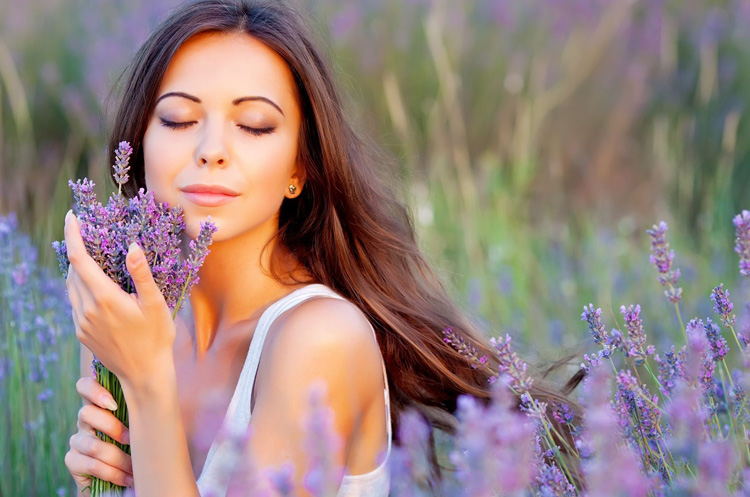10+ Uses of Lavender
Lavender and its many uses
Lavender:
Do you remember as a child walking past lavender and pulling off a few of the flowers and squeezing them between your fingers and smelling the sweet aroma all the way home?
Now when you do the same thing in milliseconds it takes you back to your childhood.
A smell can bring on a flood of memories, influence people’s moods and even affect their work performance. Because the olfactory bulb is part of the brain’s limbic system, an area so closely associated with memory and feeling it’s sometimes called the “emotional brain,” smell can call up memories and powerful responses almost instantaneously.
That is one of the beauties of Aromatherapy it transcends all boundaries.
Here are some of the other benefits and uses of Lavender:
(if you haven’t used lavender before always do a test to see if allergic)
Lavender oil is one of a few oils that can be put directly neat onto the skin.
Possible Uses:
Acne, allergies, anxiety, asthma, athlete’s foot, bruises, burns, chicken pox, colic, cuts, cystitis, depression, dermatitis, dysmenorrheal, earache, flatulence, headache, hypertension, insect bites, insect repellent, itching, labor pains, migraine, oily skin, rheumatism, scabies, scars, sores, sprains, strains, stress, stretch marks, vertigo, whooping cough.
Here are some of the many uses of lavender essential oil:
Relaxing nervous tension (Stress):
Lavender aromatherapy has been clinically evaluated for its relaxing effects on the nervous system. It helps with migraines, headaches, anxiety, depression, nervous tension and emotional stress. Just dab a few drops on your temples, neck and wrists and put a few drops on a cotton ball and keep close by & sniff throughout the day, this will calm you.
Better sleep:
Because lavender aromatherapy is so relaxing and calming, it helps induce sleep and is often used for insomnia. Put a few drops on your pillow at bedtime, or in the bedroom in a diffuser.
Muscle tension:
Lavender’s relaxing and anti-inflammatory qualities make it an excellent remedy for muscle pain and tension. There’s nothing more wonderful than a taking a hot bath with lavender essential oil to soothe and relax sore or overworked muscles or rheumatism. Be sure to add the lavender oil to bath salts or epsom salts first so they will mix with the water.
Menstrual pain:
Gently massage lavender over the lower abdomen, in a circular motion for menstrual, pre-menstrual or menopausal tension.
Respiratory infections:
Lavender aromatherapy is extensively used for various respiratory problems including throat infections, asthma, bronchitis, flu, cough, cold, asthma, sinus congestion, etc. It can be diffused into a vapor or applied topically onto the neck, chest and soles of the feet.
Lavender Skin Care:
Lavender essential oil is ideal for skin care because it is gentle, yet effective. It moisturizes, helps skin maintain elasticity and prevents the build up of excess sebum – a skin oil that bacteria feed on. It helps skin conditions such as acne, wrinkles, dermatitis, eczema, psoriasis and rashes and helps minimize stretch marks. It is also beneficial for cleansing cuts and wounds as well as burns and sunburns as it stimulates healing. It is also helpful for bruises, hives and insect bites.
Hair Care:
Lavender essential oil is useful for the hair and scalp as it conditions the scalp and prevents the build up of excess sebum. It’s antiseptic qualities disinfect the scalp, help dandruff, hair loss and prevent and treat head lice.
Massage:
A massage with lavender essential oil is a supremely relaxing and aromatic experience. Both sore muscles and joints respond to lavender’s anti-inflammatory and relaxing effects.
Freshening Closets:
In ancient days, small bundles of dried lavender were placed in closets to help keep clothes smelling fresh and keep moths away. You can do the same today by hanging sachet bags inside your closet or placing them between your sheets, in the laundry room and on your pillow. Or you can hang ceramic pieces that you’ve infused with lavender essential oil.
Calming Children:
Lavender aromatherapy is ideal for restless children and babies because it it so gentle and calming, yet powerfully antiseptic. Also because of lavender’s gentleness, it can be used “neat” (full-strength) even on baby’s skin without dilution.
Wash:
Put a couple of drops of lavender on a piece of cloth and place this in your drier; it will make the clothes smell oh so fresh.
Blood Circulation:
Lavender essential oil is also good for improving blood circulation in the body. It also lowers blood pressure and is used for hypertension.
Digestion:
Lavender oil is useful for digestion as it increases the mobility of the intestine. The oil also stimulates the production of gastric juices and bile and thus aids in treating indigestion, stomach pain, colic, flatulence, vomiting and diarrhea.
Immunity:
Regular use of lavender essential oil provides resistance to diseases.
Skin Care:
The health benefits of lavender oil for the skin can be attributed to its antiseptic and antifungal properties. It is used to treat various skin disorders such as acne, wrinkles, psoriasis, and other
Lavender Bath
Excellent for aching muscles, relaxation, stress relief. Add 6-8 drops Lavender essential oil after running the water and vigorously agitate water. Add the drops to a cupful of milk or Epsom salts and then put in the bath as this helps to disperse the oils through out the water. This is a great way to receive the benefits of Lavender oil. Lie back and enjoy!
Lavender Shower
After wetting your hair, add 3 drops Lavender oil to a cupful of water and tip onto your head. Stand under running water and allow oils to rinse off. Cup your hands over your face and breathe in the vapours. Add oils when shampooing your hair and rinse off as normal.
Lavender Vaporization
Fill the top dish of an ‘oil burner’ or ‘vaporizer’ with water and add 6-8 drops of Lavender oil. Place a lit tea light candle in the space provided underneath the dish. This is a very good way to receive the benefits of the Lavender oil. Use in the bedroom or living room. Vaporization is especially good to use when you have a cold or feel unwell. Keep burner away from draughts and open windows. Hint: use warm water in the dish for quicker results.
Lavender Oil Massage
This is a particularly effective way to apply the oils when you have tight and sore muscles or have sustained an injury. The oils will be absorbed quickly into the blood stream, thus assisting the body and mind. NEVER massage UNDILUTED oils, always use a good quality vegetable or carrier oil. Add 5 drops of Lavender oil per 10ml of vegetable oil. Use 1-2 drops for babies and the elderly. Only use lavender with babies.
Lavender Tissues/Handkerchief
Good for instant relief from flu, sinusitis and anxiety. Use 1-3 drops Lavender oil and inhale immediately as required.
Lavender Steam Inhalation
Great for colds and flu or as part of a skin/care acne regime. Add 4-6 drops to a bowl of hot water. Place a towel over your head and breathe in the vapour. Keep your eyes shut. Continue to breathe deeply for a few minutes, occasionally removing the towel and your head from the bowl.
Lavender Hand/Foot Bath
Great for tired feet, fatigue or sore/dry hands. Add 4-6 drops Lavender oil to a large bowl of warm water and soak for approx 10 minutes. Then apply a Lavender lotion for added benefits.
Lavender Compress
In a bowl or warm water add 6-8 drops Lavender oil and swirl around. Soak a cloth then gently squeeze out and apply to area of your body you wish to treat. Use cold water for treating new muscular injuries or sprains.
Lavender direct for Burns
After running cold water on the burn for approx 10 minutes, put a few drops of neat lavender oil onto the burnt area (including sunburn). This will greatly assist the healing process. ONLY use lavender. Remember serious burns must be seen to by a doctor.
The dosages mentioned are recommended for average sized adults. For the elderly, disabled, the very sick or young children, half the dose is recommended.
Business cards and Stationery:
When you give out business cards or stationery why not make a more memorable statement.
Take a tissue and place a few drops of lavender oil on it, then take a freezer bag and place your business cards, stationery, Christmas cards in the reseal able plastic bag then put the tissue with the lavender oil on it into the bag and seal it, leave it for a day or so, the lavender aroma will be absorbed by the paper.
Vacuuming:
Add a few drops of lavender oil to the vacuum filter, this will make this job more appealing and less stressful.
Warning:
Lavender should not be used during the early stages of pregnancy. Use Lavender with caution if you have low blood pressure.
Some oils can cause sensitization or allergic reactions in some individuals. Lavender is one of the few oils that can be used neat,it does not have to be diluted with a carrier oil,to get better coverage when massaging it is best used in a carrier oil.
When using a new oil for the first time, do a skin patch on a small area of skin. Place a small amount of the diluted essential oil (never use essential oils undiluted on the skin, however, Lavender is an exception to this rule as is tea Tree oil.) on the inside of your elbow and apply a bandage. Wait 24 hours to see if there is any form of reaction. Even if a particular essential oil is not known to cause irritation, this step should not be ignored. Even if oil does not irritate you, it still can irritate someone else. It is important that you always keep that in mind.
Aches and pains: We have been using lavender in our body wraps since 1995, as the therapeutic benefits of the heat and lavender help to relax muscles and keep you calm.
Lavender is also antimicrobial, anti-infectious and antiseptic, making it effective in the treatment of wounds and as a front line defense against respiratory infection. It is tonic to the cardiovascular and digestive systems, lowers blood pressure and helps thin the blood due to the presence of coumarins. Lavender is indicated for muscle spasm, sprain, strain, cramp, contracture and rheumatic pain. It is sedative to the central nervous system and relieves headache, nervous tension, and insomnia; it can also help balance mood swings. Spiritually, lavender is said to balance the physical, astral and etheric planes.
Because of lavender’s many therapeutic properties, if I were stranded on a desert island with only one essential oil, it would be lavender (it also takes the itch out of insect bites and helps heal sunburn!) But what other essential oils can be called in to use here in civilization? What should you use if your client does not want the deep relaxation or sleep-inducing effect of lavender, or if they have a tendency toward lowered metabolism or low blood pressure? What if they need to relax because they are about to take an exam, give a presentation or walk down the aisle?
*Article taken from www.wildflowersaromatherapy.com


